[高中英语]专题06 情态动词和虚拟语气-三年高考(2016-2018)英语试题分项版解析(解析版)
专题06 情态动词和虚拟语气-备战2024年高考英语一轮复习查漏补缺大闯关100道必刷题(原卷版)
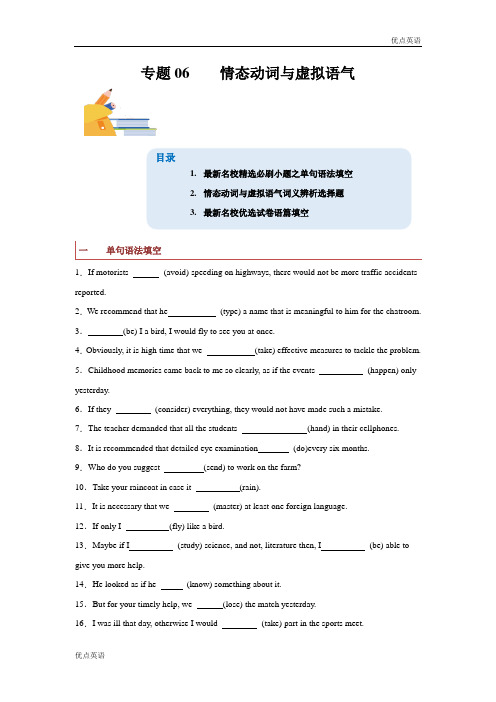
专题06 情态动词与虚拟语气目录1.最新名校精选必刷小题之单句语法填空2.情态动词与虚拟语气词义辨析选择题3.最新名校优选试卷语篇填空一单句语法填空1.If motorists (avoid) speeding on highways, there would not be more traffic accidents reported.2.We recommend that he (type) a name that is meaningful to him for the chatroom. 3.(be) I a bird, I would fly to see you at once.4.Obviously, it is high time that we (take) effective measures to tackle the problem. 5.Childhood memories came back to me so clearly, as if the events (happen) only yesterday.6.If they (consider) everything, they would not have made such a mistake.7.The teacher demanded that all the students (hand) in their cellphones. 8.It is recommended that detailed eye examination (do)every six months.9.Who do you suggest (send) to work on the farm?10.Take your raincoat in case it (rain).11.It is necessary that we (master) at least one foreign language.12.If only I (fly) like a bird.13.Maybe if I (study) science, and not, literature then, I (be) able to give you more help.14.He looked as if he (know) something about it.15.But for your timely help, we (lose) the match yesterday.16.I was ill that day, otherwise I would (take) part in the sports meet.A.should have made B.must have madeC.might make D.could make51.Be carefully. Don’t get the juice on your new dress, for it ___________wash out.A.can’t B.mustn’t C.shouldn’t D.won’t52.—I failed in the interview, because I didn’t introduce myself completely within three minutes. —You___________ the details. The main points are more important than details.A.should omit B.must omit C.should have omitted D.must have omitted 53.—______ you make so much noise?—Sorry. I’ll take care not to.A.Must B.Can C.May D.Would54.We ________ have agreed to the plan without knowing what it would cost.A.mustn’t B.may not C.oughtn’t to D.needn’t55.—_________ you come with me to Lang Lang’s piano concert this evening?—I’d love to, but I have to study for my math test.A.Should B.May C.Must D.Can56.—Why you be talking so loudly while others are studying?—I’m terribly sorry.A.shall B.must C.will D.may 57.—Tony, is that Mr. Black over there?—I knew that he had gone to England. It be him.A.might B.could C.can’t D.must 58.Richard is so tired after work that he feels ________ he could sleep for 24 hours.A.as if B.even though C.in case D.now that59.The committee has approved his ______ that he put off his gap year till he finishes the research.A.application B.wisdom C.arrangement D.request60.The manager recommended that the fresh graduate ______ a chance and decided to help the young man ______ smoking.A.be given; addicted to B.should give; addicted toC.would be given; addicting to D.should be giving; addicting to61.I strongly recommend that she _______ some kind of exercise in the morning.A.does B.did C.do D.have done 62.It’s a pity that such a talent as Jerry ______ leave his favourite work in that company.A.need B.could C.should D.may63.Had he studied harder, he ______ the exam last week.A.passed B.would passC.would have passed D.must have passed64.But for my casual attitude, I wouldn’t have been dismissed and ________ with my colleagues on the project now.A.might have worked B.would be workingC.were to work D.had worked65.It is the first time he ________ here and now it is high time that he ________ around.A.come;should be showedB.has come;was showedC.has come;be showedD.came;was showedA.wouldn’t take B.shall not takeC.not have D.won’t have67.—Do you feel like________ there or shall we take a bus?—I’d like to walk, but since there is no time left, I’d rather we________ a taxi.A.to walk;take B.walking;tookC.to walk;took D.walking;take68.I ________ you a valuable present for your birthday, but I ________ all my money.A.would like to give; ran out ofB.would like to have given; ran out ofC.would like to give; was run out ofD.would like to give; ran out69.I suggest that the person________ put into prison.A.refer toB.referred to beC.referring to should beD.referred to was70.The local authorities had given the instruction that all the old buildings there _____ pulled down.A.have to be B.will be C.be D.must be 71.He insisted what he did ______ right and the man who had spoken ill of him _____.A.was; be punished B.be; was punishedC.was; was punished D.be; be punished72.—I heard your journey was not very pleasant.—But for the sudden rain we a wonderful time.A.will have B.should have hadC.should have D.had73._____, I’d have told you.A.If I would have known itB.If I had have known itC.Had I known itD.Should I know itA.Would B.ShouldC.Could D.Might76.The people who love peace do think that it is time the violent conflicts in Libya ________.A.come to an end B.put to an endC.came to an end D.bring to an end77.They advised that a passport_____with you at all times.A.carried B.was carried C.be carried D.carry78.If you ________ that late movie last night, you wouldn’t be so sleepy now.A.haven’t watched B.hadn’t watchedC.didn’t watch D.wouldn’t have watchedA.Had it not been for B.If it were notC.If it had not been for D.Were it not for80.The order came that all the small coal mines ________down in half a year.A.would be closed B.should be closedC.must be closed D.would closePassage 1阅读下面材料,在空白处填入适当的内容(1个单词)或括号内单词的正确形式。
历年高考英语语法精讲精练-情态动词和虚拟语气有解析.doc
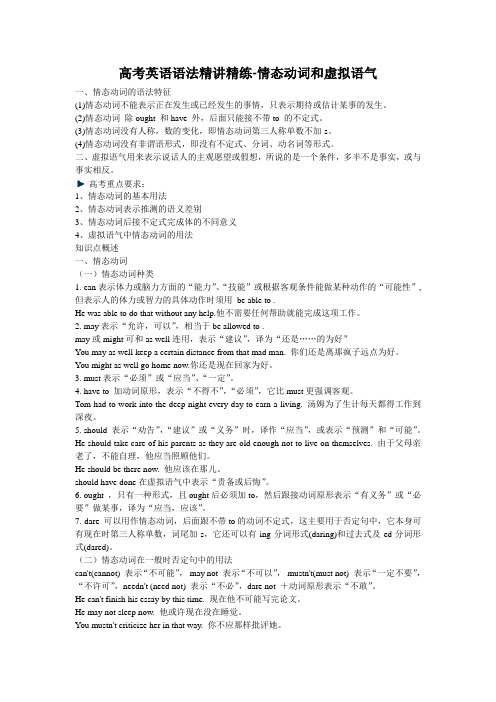
高考英语语法精讲精练-情态动词和虚拟语气一、情态动词的语法特征(1)情态动词不能表示正在发生或已经发生的事情,只表示期待或估计某事的发生。
(2)情态动词除ought 和have 外,后面只能接不带to 的不定式。
(3)情态动词没有人称,数的变化,即情态动词第三人称单数不加-s。
(4)情态动词没有非谓语形式,即没有不定式、分词、动名词等形式。
二、虚拟语气用来表示说话人的主观愿望或假想,所说的是一个条件,多半不是事实,或与事实相反。
高考重点要求:1、情态动词的基本用法2、情态动词表示推测的语义差别3、情态动词后接不定式完成体的不同意义4、虚拟语气中情态动词的用法知识点概述一、情态动词(一)情态动词种类1. can表示体力或脑力方面的“能力”、“技能”或根据客观条件能做某种动作的“可能性”, 但表示人的体力或智力的具体动作时须用be able to .He was able to do that without any help.他不需要任何帮助就能完成这项工作。
2. may表示“允许,可以”,相当于be allowed to .may或might可和as well连用,表示“建议”,译为“还是……的为好”You may as well keep a certain distance from that mad man. 你们还是离那疯子远点为好。
You might as well go home now.你还是现在回家为好。
3. must表示“必须”或“应当”、“一定”。
4. have to 加动词原形,表示“不得不”,“必须”,它比must更强调客观。
Tom had to work into the deep night every day to earn a living. 汤姆为了生计每天都得工作到深夜。
5. should 表示“劝告”,“建议”或“义务”时,译作“应当”,或表示“预测”和“可能”。
专题06情态动词和虚拟语气-三年(2017-2019)高考真题英语分项汇编(解析版)
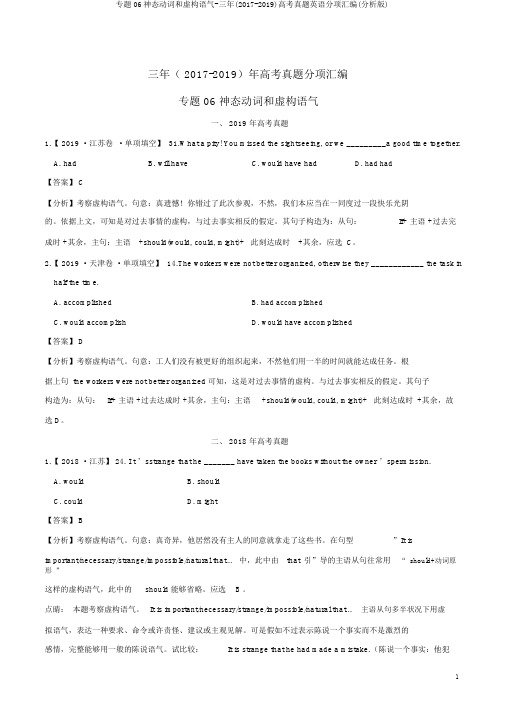
三年( 2017-2019)年高考真题分项汇编专题 06 神态动词和虚构语气一、 2019 年高考真题1.【 2019 ·江苏卷·单项填空】 31.What a pity! You missed the sightseeing, or we _________a good time together.A. hadB. will haveC. would have hadD. had had【答案】 C【分析】考察虚构语气。
句意:真遗憾!你错过了此次参观,不然,我们本应当在一同度过一段快乐光阴的。
依据上文,可知是对过去事情的虚构,与过去事实相反的假定。
其句子构造为:从句:If+ 主语 +过去完成时 +其余,主句:主语+should(would, could, might)+此刻达成时+其余,应选C。
2.【 2019 ·天津卷·单项填空】 14.The workers were not better organized, otherwise they ____________ the task inhalf the time.A. accomplishedB. had accomplishedC. would accomplishD. would have accomplished【答案】 D【分析】考察虚构语气。
句意:工人们没有被更好的组织起来,不然他们用一半的时间就能达成任务。
根据上句 the workers were not better organized 可知,这是对过去事情的虚构。
与过去事实相反的假定。
其句子构造为:从句:If+ 主语 +过去达成时 +其余,主句:主语+should(would, could, might)+此刻达成时+其余,故选 D。
二、 2018 年高考真题1.【 2018 ·江苏】 24. I t ’s strange that he _______ have taken the books without the owner ’s permission.A. wouldB. shouldC. couldD. might【答案】 B【分析】考察虚构语气。
专题06情态动词和虚拟语气-三年高考(2016-2018)英语试题分项版解析

2018年高考题1.【2018·江苏】24. It’s strange that he _______have taken the books without the owner’s permission.A. wouldB. shouldC. couldD. might【答案】B点睛:本题考查虚拟语气。
It is important/necessary/strange/impossible/natural that... 主语从句多数情况下用虚拟语气,表达一种要求、命令或者责备、建议或主观看法。
但是如果只是表示陈述一个事实而不是强烈的感情,完全可以用一般的陈述语气。
试比较: It is strange that he had made a mistake.(陈述一个事实:他犯了错误让人有点奇怪。
) It is strange that he (should) have made a mistake. (虚拟语气,说话者是在责备他本不应该犯错。
)2.【2018·江苏】27. There is a good social life in the village, and I wish I _______ a second chance to become more involved.A. hadB. will haveC. would have hadD. have had【答案】A【解析】考查虚拟语气。
句意:在这个村里有很好的社交生活,并且我希望我再有机会去更多的参与。
本题考查wish引导的宾语从句,表示与现在事实相反的愿望,所以从句用一般过去时。
故选A。
点睛:本题考查wish引导的虚拟语气。
由wish引起的表示愿望的虚拟语气:1.用wish表示对现在的愿望时,它所引起的宾语从句中谓语动词形式为:过去式(be动词用were)。
2.用wish表示对将来的愿望时,它所引起的宾语从句中谓语动词形式为:would, could, might+ 动词原形。
高考英语情态动词和虚拟语气复习(完整版)

高考英语情态动词和虚拟语气复习【名师精讲必考语法,值得下载练习】情态动词是一种本身有一定的词义,后面加动词原形,给谓语动词增添情感色彩,表示说话人对有关行为或事物的态度和看法,认为其可能、应该或必要等。
一、情态动词的分类1.只做情态动词:must, can(could), may(might), ought to, should2.可做情态动词又可做实意动词:need, dare(dared)3.可做情态动词又可作助动词:shall, will(would)4.具有情态动词特征:have(had) to, used to, had better (not) do二、情态动词的特点1.情态动词没有人称和数的变化。
2. 情态动词后跟动词原形,否定式构成是在情态动词后面加“not”。
3. 情态动词属非及物动词,故没有被动语态。
三、情态动词的基本用法1.can/ could1) 表示能力Can you lift this heavy box?Mary can speak English fluently.此时可用be able to 代替。
can 只有一般现在时和一般过去式;而be able to 则有更多的时态。
I’ll be able to come this afternoon.注意:当表示“经过努力而成功做到某事时”不能用could, 而用was/were able to do= succeeded in doing= managedto doHe was able to go to the party yesterday in spite of the heavy rain.2) 表示可观可能性(客观原因形成的能力)。
译为“能够;可以”This hall can hold 500people at least.3) 某人或某物一时的可能性,常译为“有时(可能)会”It is usually warm in my hometown in March, but it can be rather cold sometimes.Little children can be very naughty.4) 表示请求和允许----- Can I go now?----- Yes, you can. No, you can’t.此时可与may 互换。
高中英语:情态动词与虚拟语气语法知识点
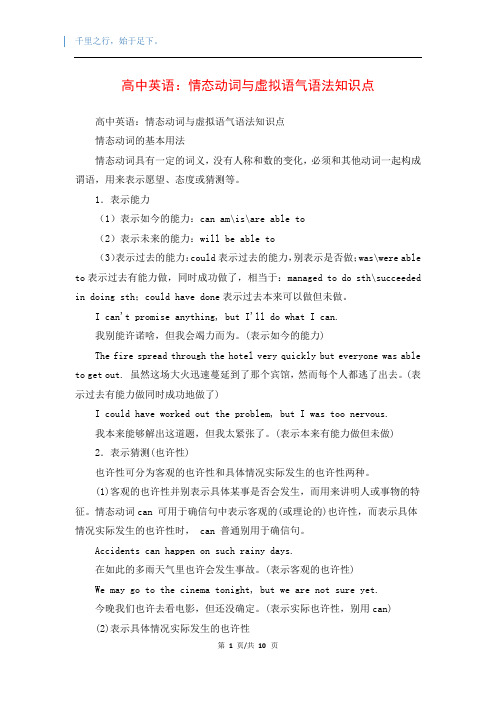
高中英语:情态动词与虚拟语气语法知识点高中英语:情态动词与虚拟语气语法知识点情态动词的基本用法情态动词具有一定的词义,没有人称和数的变化,必须和其他动词一起构成谓语,用来表示愿望、态度或猜测等。
1.表示能力(1)表示如今的能力:can am\is\are able to(2)表示未来的能力:will be able to(3)表示过去的能力:could表示过去的能力,别表示是否做;was\were able to表示过去有能力做,同时成功做了,相当于:managed to do sth\succeeded in doing sth;could have done表示过去本来可以做但未做。
I can't promise anything, but I'll do what I can.我别能许诺啥,但我会竭力而为。
(表示如今的能力)The fire spread through the hotel very quickly but everyone was able to get out. 虽然这场大火迅速蔓延到了那个宾馆,然而每个人都逃了出去。
(表示过去有能力做同时成功地做了)I could have worked out the problem, but I was too nervous.我本来能够解出这道题,但我太紧张了。
(表示本来有能力做但未做)2.表示猜测(也许性)也许性可分为客观的也许性和具体情况实际发生的也许性两种。
(1)客观的也许性并别表示具体某事是否会发生,而用来讲明人或事物的特征。
情态动词can 可用于确信句中表示客观的(或理论的)也许性,而表示具体情况实际发生的也许性时, can 普通别用于确信句。
Accidents can happen on such rainy days.在如此的多雨天气里也许会发生事故。
(表示客观的也许性)We may go to the cinema tonight, but we are not sure yet.今晚我们也许去看电影,但还没确定。
高考英语语法考点解读:情态动词和虚拟语气

情态动词主要用来表示说话人的情感、态等,是中英语语法的重点,也是高考的热点,是单项填空必考的一个知识点。
情态动词在近五高考中主要考查四点:情态动词表示推测和可能性的用法;情态动词与虚拟语气;情态动词表达“情感、态、语气等”;情态动词表示“必要性”等方面的用法。
虚拟语气的考点主要集中在名词性从句、条件句中的用法,以及错综条件句中虚拟语气的应用。
一、情态动词表推测的用法headmaster.①That maynot be true.①He couldn'thavediscovered thetruth.注意:should (ought to)表示推测是高考考查的重点和难点。
如:—When can I come for the photos?I need them tomorrow afternoon.—They ________ be ready by 12:00.A.can B.should C.might D.need【解析】B A项表示推测时常用于否定句和疑问句中。
C项表示推测语气不太肯定。
should意为“按理说,理应”,既回答了顾客的询问,不失礼貌,又为照片有可能尚未洗好,顾客到时取不到留下了回旋的余地,体现了店主的精明与用词经过仔细推敲。
二、情态动词的其他用法1.can, could, may, might2.must, should3. need, dare4.shall/will/would4.shall/will/would4.shall/will/would二、情态动词+have done四、虚拟语气虚拟语气表示说话人所说的话不是事实,而是一种假设、愿望、怀疑或推测。
1.虚拟语气在条件句中的用法If it were to rain tomorrow, I should not drive my car. 如果明天下雨的话,我就不开车了。
(明天的情况还不知道)If I had done it in time, I should have had a good time. 如果我及时做的话,日子就好过多了。
高三英语寒假作业专题06情态动词和虚拟语气(学)
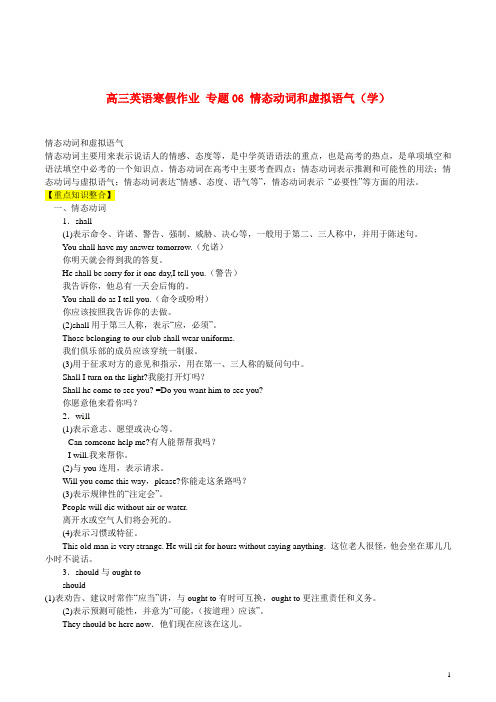
高三英语寒假作业专题06 情态动词和虚拟语气(学)情态动词和虚拟语气情态动词主要用来表示说话人的情感、态度等,是中学英语语法的重点,也是高考的热点,是单项填空和语法填空中必考的一个知识点。
情态动词在高考中主要考查四点:情态动词表示推测和可能性的用法;情态动词与虚拟语气;情态动词表达“情感、态度、语气等”,情态动词表示“必要性”等方面的用法。
【重点知识整合】一、情态动词1.shall(1)表示命令、许诺、警告、强制、威胁、决心等,一般用于第二、三人称中,并用于陈述句。
You shall have my answer tomorrow.(允诺)你明天就会得到我的答复。
He shall be sorry for it one day,I tell you.(警告)我告诉你,他总有一天会后悔的。
You shall do as I tell you.(命令或吩咐)你应该按照我告诉你的去做。
(2)shall用于第三人称,表示“应,必须”。
Those belonging to our club shall wear uniforms.我们俱乐部的成员应该穿统一制服。
(3)用于征求对方的意见和指示,用在第一、三人称的疑问句中。
Shall I turn on the light?我能打开灯吗?Shall he come to see you? =Do you want him to see you?你愿意他来看你吗?2.will(1)表示意志、愿望或决心等。
--Can someone help me?有人能帮帮我吗?--I will.我来帮你。
(2)与you连用,表示请求。
Will you come this way,please?你能走这条路吗?(3)表示规律性的“注定会”。
People will die without air or water.离开水或空气人们将会死的。
(4)表示习惯或特征。
This old man is very strange. He will sit for hours without saying anything.这位老人很怪,他会坐在那儿几小时不说话。
- 1、下载文档前请自行甄别文档内容的完整性,平台不提供额外的编辑、内容补充、找答案等附加服务。
- 2、"仅部分预览"的文档,不可在线预览部分如存在完整性等问题,可反馈申请退款(可完整预览的文档不适用该条件!)。
- 3、如文档侵犯您的权益,请联系客服反馈,我们会尽快为您处理(人工客服工作时间:9:00-18:30)。
2018年高考题1.【2018·江苏】24. It’s strange that he _______ have taken the books without the owner’s permission.A. wouldB. shouldC. couldD. might【答案】B点睛:本题考查虚拟语气.It is important/necessary/strange/impossible/natural that... 主语从句多数情况下用虚拟语气,表达一种要求、命令或者责备、建议或主观看法.但是如果只是表示陈述一个事实而不是强烈的感情,完全可以用一般的陈述语气.试比较:It is strange that he had made a mistake.(陈述一个事实:他犯了错误让人有点奇怪.)It is strange that he (should) have made a mistake. (虚拟语气,说话者是在责备他本不应该犯错.)2.【2018·江苏】27. There is a good social life in the village, and I wish I _______ a second chance to become more involved.A. hadB. will haveC. would have hadD. have had【答案】A【解析】考查虚拟语气.句意:在这个村里有很好的社交生活,并且我希望我再有机会去更多的参与.本题考查wish引导的宾语从句,表示与现在事实相反的愿望,所以从句用一般过去时.故选A.点睛:本题考查wish引导的虚拟语气.由wish引起的表示愿望的虚拟语气:1.用wish表示对现在的愿望时,它所引起的宾语从句中谓语动词形式为:过去式(be动词用were).2.用wish表示对将来的愿望时,它所引起的宾语从句中谓语动词形式为:would, could, might+ 动词原形.3.wish用于对过去的事实表示一种不可能实现的愿望时,宾语从句中的谓语动词形式为:had+动词过去分词或could, would + have +动词过去分词.分析此题需抓住前句There is a good social life in the village的时态是一般现在时,可以判断出此题wish用于对现在的事实表示一种不可能实现的愿望.3.【2018·天津】10. I can't find my purse. I___________ it in the supermarket yesterday, but I'm not sure.A. should leaveB. must have leftC. might leaveD. could have left【答案】D点睛:情态动词是每年高考的热点也是难点.本题抓住两点:第一、时态.根据句中时间状语可以判断出是对过去事情的推测,故用情态动词+ have done;如果是对现在事情的推测,才用情态动词+v原形.第二、情态动词的选择.must为肯定推测,表示“一定”,could为不肯定推测,表示“可能”,这样就能选出正确答案.4.【2018·北京】12. In today’s information age, the loss of data _________ cause serious problems for a company.A. needB. shouldC. canD. must【答案】C【解析】考查情态动词.句意:在今天的信息时代,数据的丢失有时会对一个公司造成严重的问题.数据丢失造成严重问题是客观上会发生的情况,即“客观可能性”,故该空应用情态动词can.C选项正确.其余情态动词均没有该用法.need需要;should应该,竟然;must必须,肯定.点睛:can的基本用法:1. (表示能力、功能)能,会;2. (表示推测)可能,可能会;3.(表示允许,请求)可以;4.(表示客观可能性)有时会.5.【2018·北京】13. They might have found a better hotel if they _________ a few more kilometers.A. droveB. would driveC. were to driveD. had driven【答案】D【解析】考查虚拟语气.句意:如果他们多开几公里的话,他们也许会找到一个更好的旅馆.由“they might have found a better hotel”可知,该句是表示对过去的虚拟.if ____ a few more kilometers是条件句部分,表示对过去的虚拟,条件句部分要用过去完成时态,故D选项正确.点睛:1. 表示对现在的虚拟:if条件句用一般过去时,主句用would/might/could/should+do;2. 表示对过去的虚拟:if条件句用过去完成时,主句用would/might/could/should+have done;3. 表示对将来的虚拟:if条件句用were to do/should do/一般过去时,主句用would/might/could/should+do.6.【2018·天津】15. If we ___________the flight yesterday, we would be enjoying our holiday on the beachA. had caughtB. caughtC. have caughtD. would catch【答案】A【解析】考查虚拟语气.句意:如果我们昨天赶上飞机的话,现在我们正在海滩享受我们的假日了.根据时间状语yesterday可知,从句表示与过去事实相反,故用had + v-ed.故选A.点睛:本题考查虚拟语气.虚拟语气重要做题原则:根据题干中主句或从句中动词形式判断所考查的动词的虚拟时间,一般要保持一致,但要注意错综时间虚拟语气要根据各自所表示的虚拟时间做出调整.本题就是错综条件虚拟语气,从句与过去事实相反,故用had + v-ed,主句与现在事实相反.学科+网2017年高考题【2017·北京卷】21. Samuel, the tallest boy in our class, ______ easily reach the books on the top shelf.A. mustB. shouldC. canD. need【答案】C考点:考查情态动词【名师点睛】常用的情态动词有can,may,must,need, should等1. can 的用法:①表示能力“能,会” eg: He can speak a little Japanese.他会说一点日语.②表示请求或许可“可以” eg: Can I help you? 要我帮忙吗?③表示猜测“可能” eg: Where can she go now? 她可能到哪里去了呢?2.may 的用法:①表示请求或允许“可以”“准许” eg: May I go home,please?请问我可以回家吗?②表示可能性“ 可能”、也许” eg: I think it may rain this afternoon. 我想今天下午可能下雨.注:might为may的过去式,但也可以代替may,语气较为婉转客气或更加不肯定.eg: ①He might not come today.今天他也许不来了.(语气不肯定)②You might also get a headache when you work too hard,当你工作太努力时,你也可能患头痛3. must的用法:①表示义务、必要或命令“必须、应该” eg: You must come early tomorrow.你明天得早来.②表示推测时“肯定,一定” eg: They must be at home.The light is on 他们肯定在家,灯亮着呢.③must not 禁止,不许eg: You must not tell lies. 你不许撒谎.注意:①must开头的疑问句,其否定回答通常用don't have to 或needn't .而不用mustn'teg: ---Must I finish my homework first? 我必须先完成作业吗?---No, you don't have to/ needn't. 不,你不必.②can 和must在表推测时,can一般否定句中,而must 常用于肯定句中.eg: ①It can not be Li Lei 那个人不可能是李磊②It must be Li Lei 那个人肯定是李磊.4. need 的用法:①情态动词“需要, 有必要”一般用于否定句或疑问句中.eg: You needn't come here this afternoon.你今天下午不必来.②行为动词“需要, 有必要” 可以用于各种句式中.eg: ①You don't need to go now. 你不必现在就走.②I need to have a rest. 我需要休息一下③Do we need to finish all the work today? 我们今天需要完成所有的工作吗?need的用法的助记口诀:实义动词表“需要”,后接名、代、不定式. need后接动名词,主动形式表被动.情态动词表“需要”,没有人称数之变. 其后直接加动原,多用疑问与否定.【2017·北京卷】34. If the new safety system _______ to use, the accident would never have happened.A. had been putB. were putC. should be putD. would be put【答案】A考点:考查虚拟语气.【名师点睛】英语中的三种语气,语气是动词的一种形式,用来说明我们对自己的话所采取的态度.1、陈述语气(疑问,否定,肯定,感叹)2、祈使语气(命令,要求,建议,警告)3、虚拟语气:不可能发生的事,愿望,建议,与事实相反的假设等.一、虚拟语气在条件中的具体用法真实条件句If you work hard,you’ll surely pass the exam. 虚拟条件句(假设情况不存在,实现机会很小) If I were a bird, I could fly freely in the sky.1.与现在事实相反if 从句:动词过去式(be---were ) 主句:would/could/might/should+动词原形 If we had time, we would go with you. If I were you, I shouldn’t do that. If it weren’t raining, we wouldn’t stay. 2.与过去事实相反 if 从句:had done主句:would/could/might/should+have doneIf the teacher hadn’t helped us, we couldn’t have succeeded. I could have done it better if I had been more careful. If he hadn’t been ill, he might have come. 3.与将来事实可能相反if 从句:a.动词过去式(be 一律用were ) b.should+动词原形(不能用would ) c.were to+动词原形主句:would/could/might/should+动词原形 If he came tomorrow, I would tell him everything.if 从句的谓语动词主句谓语动词1.与现在事实相反动词过去式(be 一律用were )would/could/might/should+动词原形2.与过去事实相反had donewould/could/might/should+have done3.与将来事实可能相反a.动词过去式(be 一律用were )b.should+动词原形(不能用would )c.were to+动词原形would/could/might/should+动词原形If it should rain tomorrow, I would stay at home and watch TV.If it were to snow tomorrow, they would not go out.Should he come tomorrow, please give the book to him.4.错综时间条件句在虚拟语气中,有时条件从句动作发生的时间和主句动作发生的时间是不一致的,称为错综时间条件句.这种句子的形式往往要根据句子的时间相调整,分别处理.If you had spoken to him yesterday, you would know what to do now.If you had followed th e doctor’s advice then, you would be all right now.If you had watered them more, the crops would be growing still better now.(有时时间会省略)5.含蓄条件句有时虚拟条件不用if条件从句,而用介词或介词短语来表示.They would not be able to live without him.(如果没有)He would have failed but for his teacher’s timely advice.(要不是)=if it had not been forIf only you had worked with greater care!(要是......就好了)You would have done the same thing in her position.With a little more care you could have avoid the traffic accident.6.虚拟结合条件句在虚拟语气中,假设的情况有时间可以通过上下文或其他方式表现出来,并且虚拟的情况和真实的情况同时存在.I was ill that day. Otherwise, I would have taken part in the singing competition.(实------虚)=I was ill that day. If I hadn’t been ill that day, I would have taken part in the singing competition.He would have bought the piano, but he didn’t have enough money.(虚------实)=He would have bought the piano if he had had enough money, but in fac t he didn’t have enough money.7.省略if倒装条件句在虚拟语气中,if从句假设的情况中如果有助动词had, should和were,那么可省略if,把had, should和were放在句首构成倒装,简称省略if倒装条件句.If he had finished the work yesterday, he would have gone to the concert with you.=Had he finished the work yesterday, he would have gone to the concert with you.If I were you, I wouldn’t do that.=were I you, I wouldn’t do that.If I should meet him, I would tell him about it.=Should I meet him, I would tell him about it.【2017·江苏卷】22. _______ not for the support of the teachers, the student could not overcome her difficulty. A. It were B. Were it C. It was D. Was it【答案】B【名师点睛】在虚拟语气中,be动词只能用were;虚拟条件句省去连词if时,从句主谓部分倒装:Were/Had/Should+主语+谓语动词...e.g. Were I Tom, I would refuse. 如果我是汤姆,我会拒绝.I will go, should it be necessary. 假若有必要,我会去的.Had it not been for the bad weather we would have arrived in time. 若不是天气坏,我们就准时到达了.若条件从句为否定句,否定词not应置于主语之后,而不能与were, should, had 等缩略成Weren’t, Shouldn’t, Hadn’t置于句首.考点:考查虚拟语气和倒装【2017·天津卷】2. My room is a mess, but I __________clean it before I go out tonight. I can do it in the morning.A. daren’tB. shouldn’tC. needn’tD. mustn’t【答案】C【解析】试题分析:句意:我的房间很乱,但是在今晚我出去之前不需要打扫,我可以明天早晨再打扫.A.不敢;B.不应该;C不需要;D.不许.根据句意,故选C.考点:考查情态动词.【名师点睛】情态动词主要考查句意和说话人的语气的强弱,这几个情态动词的否定形式意思各不相同,确定各自的含义,弄清它们的区别再结合上下文语境就不难理解了. daren’t通常表示“不敢”,shouldn’t强调的是没有义务,必要性;needn’t表示“不需要”,mustn't 表示不许,语气比较强烈,它们之间有明显不同.学科+网【2017·天津卷】15. —Do you have Betty’s phone number?—Yes. Otherwise, I ______able to reach her yesterday.A. hadn’t beenB. wouldn’t have beenC. weren’tD. wouldn’t be【答案】B【名师点睛】if的虚拟语气非常重要,首先要熟悉基本用法:1、表示与现在事实相反的情况,从句:If主语+过去时(be动词用were);主句:主语+should/would/could/might+do:2、表示与过去事实相反的情况,从句:If主语+had+done;主句:主语+should/ would/ could/ might+have done 3、表示对将来情况的主观推测,从句:①if+主语+were to do②if+主语+should+do ③if+主语+did(动词过去式)/were ;主句:主语+should /would/ could /might+do,另外要注意从句也可以省略if,把had,were,should提前.这句话的虚拟语气是根据标志词otherwise和句意推断出主句是对过去的虚拟.2016年高考题1.【2016·北京】31. I love the weekend, because I ________ get up early on Saturdays and Sundays.A. needn’tB. mustn’tC. wouldn’tD. shouldn’t【答案】A【解析】试题分析:题目考查情态动词.句意:我喜欢周末,因为周六和周日我不需要早起.A. n eedn’t不需要;B. mustn’t 禁止;C. wouldn’t不愿;D. shouldn’t不应该.根据句意可知,周六、周日不用早起,故选A.考点:考查情态动词【名师点睛】常用的情态动词有can,may,must,need,should, had better.1. can 的用法:①表示能力“能,会” eg: He can speak a little Japanese.他会说一点日语.②表示请求或许可“可以” eg: Can I help you?要我帮忙吗?③表示猜测“可能” eg: Where can she go now? 她可能到哪里去了呢?2.may 的用法:①表示请求或允许“可以”“准许” eg: May I go home,please?请问我可以回家吗?②表示可能性“ 可能”、也许” eg: I think it may rain this afternoon. 我想今天下午可能下雨.注:might为may的过去式,但也可以代替may,语气较为婉转客气或更加不肯定.eg: ① He might not come today.今天他也许不来了.(语气不肯定)②You might also get a headache when you work too hard,当你工作太努力时,你也可能患头痛3. must的用法:①表示义务、必要或命令“必须、应该” eg: You must come early tomorrow.你明天得早来.②表示推测时“肯定,一定” eg: They must be at home.The light is on 他们肯定在家,灯亮着呢.③ must not 禁止,不许eg: You must not tell lies. 你不许撒谎.注意:①must开头的疑问句,其否定回答通常用don't have to 或needn't .而不用mustn'teg: ---Must I finish my homework first? 我必须先完成作业吗?---No, you don't have to/ needn't. 不,你不必.②can 和must在表推测时,can一般否定句中,而must 常用于肯定句中.eg: ①It can not be Li Lei 那个人不可能是李磊② It must be Li Lei 那个人肯定是李磊.4. need 的用法:①情态动词“需要, 有必要”一般用于否定句或疑问句中.eg: You needn't come here this afternoon.你今天下午不必来.②行为动词“需要, 有必要” 可以用于各种句式中.eg: ①You don't need to go now. 你不必现在就走.② I need to have a rest. 我需要休息一下③ Do we need to finish all the work today? 我们今天需要完成所有的工作吗?need的用法的助记口诀:实义动词表“需要”,后接名、代、不定式. need后接动名词,主动形式表被动.情态动词表“需要”,没有人称数之变. 其后直接加动原,多用疑问与否定.2.【2016·北京】34. Why didn’t you tell me about your trouble last week? If you ________ me, I could have helped.A. toldB. had toldC. were to tellD. would tell【答案】B考点:考查虚拟语气 【名师点睛】英语中的三种语气,语气是动词的一种形式,用来说明我们对自己的话所采取的态度. 4、陈述语气(疑问,否定,肯定,感叹) 5、祈使语气(命令,要求,建议,警告)6、虚拟语气:不可能发生的事,愿望,建议,与事实相反的假设等. 二、虚拟语气在条件中的具体用法 真实条件句If you work hard,you’ll surely pass the exam. 虚拟条件句(假设情况不存在,实现机会很小) If I were a bird, I could fly freely in the sky. If it snowed tomorrow, we would stay at the home.2.与现在事实相反if 从句:动词过去式(be---were ) 主句:would/could/might/should+动词原形 If we had time, we would go with you. If I were you, I shouldn’t do that.if 从句的谓语动词主句谓语动词1.与现在事实相反动词过去式(be 一律用were )would/could/might/should+动词原形2.与过去事实相反had donewould/could/might/should+have done3.与将来事实可能相反a.动词过去式(be 一律用were )b.should+动词原形(不能用would )c.were to+动词原形would/could/might/should+动词原形If it weren’t raining, we wouldn’t stay.3.与过去事实相反if从句:had done主句:would/could/might/should+have doneIf the teacher hadn’t helped us, we couldn’t have succeeded.I could have done it better if I had been more careful.If he hadn’t been ill, he might have come.3.与将来事实可能相反if从句:a.动词过去式(be一律用were)b.should+动词原形(不能用would)c.were to+动词原形主句:would/could/might/should+动词原形If he came tomorrow, I would tell him everything.If it should rain tomorrow, I would stay at home and watch TV.If it were to snow tomorrow, they would not go out.Should he come tomorrow, please give the book to him.5.错综时间条件句在虚拟语气中,有时条件从句动作发生的时间和主句动作发生的时间是不一致的,称为错综时间条件句.这种句子的形式往往要根据句子的时间相调整,分别处理.If you had spoken to him yesterday, you would know what to do now.If you had followed the doctor’s advice then, you would be all right now.If you had watered them more, the crops would be growing still better now.(有时时间会省略)6.含蓄条件句有时虚拟条件不用if条件从句,而用介词或介词短语来表示.They would not be able to live without him.(如果没有)He would have failed but for his teacher’s timely advice.(要不是)=if it had not been forIf only you had worked with greater care!(要是......就好了)You would have done the same thing in her position.With a little more care you could have avoid the traffic accident.7.虚拟结合条件句在虚拟语气中,假设的情况有时间可以通过上下文或其他方式表现出来,并且虚拟的情况和真实的情况同时存在.I was ill that day. Otherwise, I would have taken part in the singing competition.(实------虚)=I was ill that day. If I hadn’t been ill that day, I would hav e taken part in the singing competition.He would have bought the piano, but he didn’t have enough money.(虚------实)=He would have bought the piano if he had had enough money, but in fact he didn’t have enough money.8.省略if倒装条件句在虚拟语气中,if从句假设的情况中如果有助动词had, should和were,那么可省略if,把had, should和were放在句首构成倒装,简称省略if倒装条件句.If he had finished the work yesterday, he would have gone to the concert with you.=Had he finished the work yesterday, he would have gone to the concert with you.If I were you, I wouldn’t do th at.=were I you, I wouldn’t do that.If I should meet him, I would tell him about it.=Should I meet him, I would tell him about it.3.【2016·江苏】27.If it for his invitation the other day, I should not be here now.A. had not beenB. should not beC. were not to beD. should not have been【答案】A【名师点睛】有时条件从句和主句所表示的动作在时间上可以不一致(例如一个与过去事实相反,另一个与现在事实相反),这种虚拟条件句就称为错综时间虚拟条件句.在这种条件句中,动词的形式要根据具体情况进行调整.例句:She would never have behaved like that if she had some common sense.如果她有一些常识的话,她就决不会像那样做了.If I had a bike (now), I would have lent it to you yesterday.假如我有自行车,昨天早就借给你了.句型说明:错综时间条件句中,特别注意时间状语,在这种情况下必须明确给以时间或通过上下文可明白看出时间不同,否则就按一般时间搭配使用.学科+网考点:考查虚拟语气4.【2016·天津】5. It was really annoying; I _____ get access to the data bank you had recommended.A. wouldn’tB. couldn’tC. shouldn’tD. needn’t【答案】B考点:考查情态动词.【名师点睛】情态动词主要考查句意和说话人的语气的强弱,这几个情态动词的否定形式意思各不相同,确定各自的含义,弄清它们的区别再结合上下文语境就不难理解了.couldn’t通常表示“没有能力”,wo uldn’t带有意愿色彩,shouldn’t强调的是没有义务,必要性;needn’t表示“没有需要”,之间有明显不同.5.【2016·天津】15. I was wearing a seatbelt. If I hadn’t been wearing one, I ____.A. were injuredB. would be injuredC. had been injuredD. would have been injured【答案】D【解析】试题分析:句意:我当时系着安全带.如果我没有系安全带,我就会受伤了.使用虚拟语气,根据if条件句用的had done,可知,主句用would have done表示对过去情况的虚拟,而且I和injure是被动关系.故选D.【名师点睛】if的虚拟语气非常重要,首先要熟悉基本用法:1、表示与现在事实相反的情况,从句:If主语+过去时(be动词用were);主句:主语+should/would/could/might+do:2、表示与过去事实相反的情况,从句:If主语+had+done;主句:主语+should/ would/ could/ might+have done3、表示对将来情况的主观推测,从句:①if+主语+were to do②if+主语+should+do ③if+主语+did(动词过去式)/were ;主句:主语+should /would/could /might+do,另外要注意从句也可以省略if,把had,were,should提前.这句话的虚拟语气比较明显,if条件句使用了过去完成进行时和过去相反,没有倒装形式,学生容易看出.6.【2016·浙江】15. Had the governments and scientists not worked together , AIDS-related deaths _______ since their highest in 2005.A. had not fallenB. would not fallC. did not fallD. would not have fallen【答案】D考点:考查虚拟语气.【名师点睛】if的虚拟语气非常重要,首先要熟悉基本用法:1、表示与现在事实相反的情况,从句:If主语+过去时(be动词用were);主句:主语+should/would/could/might+do:2、表示与过去事实相反的情况,从句:If主语+had+done;主句:主语+should/ would/ could/ might+have done3、表示对将来情况的主观推测,从句:①if+主语+were to do②if+主语+should+do ③if+主语+did(动词过去式)/were ;主句:主语+should /would/ could /might+do,另外要注意从句也可以省略if,把had,were,should提前.这句话的虚拟语气比较明显,if条件句省略了if,将had提前,说明使用了过去完成进行时和过去相反,学生看出这点就容易做题了.7.【2016·浙江】17. George _________ too far . His coffee is still warm .A. must have goneB. might have goneC. can't have goneD. needn't have gone【答案】C【解析】试题分析:乔治不可能走得太远了.他的咖啡仍然是温的.can’t have done是对过去的否定推测;must have done 过去一定做了某事;might have done过去可能做了某事;needn’t have done过去本不必做某事.故选C. 考点:考查情态动词+have done.【名师点睛】熟练掌握情态动词的用法,对准确理解语法填空、完形填空、阅读理解、听力理解中含有情态动词的句子是很有益处的,并且在写作中也可能会用到情态动词.因此,我们应当学好情态动词,尤其要掌握好常用情态动词的用法.情态动词+have done的用法:情态动词无论是表达“推测和可能性”,还是表达“虚拟”这一概念,只要是对过去已经发生的事情进行描述,一律用“情态动词+have done”这一结构;对现在或将来的事情进行描述,用“情态动词+动词或系动词原形”.注意不同的情态动词和have done搭配的含义.表示推测的can have done一般用于疑问和否定句中.2015年高考题1.【2015·北京】29.—Can’t you stay a little longer?—It’s getting late. I really _____go now, My daughter is home alone.A .mayB .canC . mustD .dare【答案】C【考点定位】考查情态动词辨析【名师点睛】本题是考查情态动词,这里考查的是语气的强度,在这里结合语境是“一定”的意思,所以要做好此类辨析题需掌握情态动词选项的语气并结合语境.2.【2015·北京】34. If I _____it with my own eyes ,I wouldn’t have believed it.A . didn’t see B. weren’t seeing C. wouldn’t see D. hadn’t seen【答案】D【解析】试题分析:句意:如果不是我亲眼看到,我不会相信.根据后半句wouldn’t have believed可以判断是对过去的虚拟.所以从句是if+主语+ had+done的形式.故选D.【考点定位】虚拟语气【名师点睛】条件句中有if引导时,首先要根据句意和句子结构判断是真实条件句还是虚拟条件句,如果符合虚拟的结构,就可以根据句子中的时间和语意判断应该用哪种虚拟语气.3.【2015·重庆】7.Without his wartime experiences, Hemingway____ his famous novel A Farewell to Arms.A.d idn’t writeB. hadn’t writtenC. wouldn’t writeD. wouldn’t have written【答案】D【考点定位】考查虚拟语气【名师点睛】虚拟语气是一种动词形式,表示说话人的一种愿望,假设,怀疑,猜测建议等含义,表示的含义不是客观存在的事实,此类的题目一般难度不大,主要找对时间状语,并且看分清时间状语与主句还是从句有关系,再来确定用对现在,过去还是将来的虚拟.4.【2015·重庆】12. You ____ be Carol. You haven’t changed a bit after all these years.A. mustB. canC. willD. shall【答案】A【解析】试题分析:句意:你肯定是卡罗,这些年你一点也没有变化. must表示对现在的肯定推测. 故选A.【考点定位】考查情态动词.【名师点睛】must表推测的用法must表示很有把握的推测,其意为“一定会”“肯定会”,只用于肯定句,一般不用于否定句或疑问句.表示对现在或未来的情况作推测,后接动词原形.You have worked hard all day. You must be tired 你辛苦一整天,一定累了(对现在情况的推测判断)I didn’t hear the phone. I must have be asleep. 我刚才没有听到电话,我想必是睡着了.5.【2015·浙江】4. It was so noisy that we hear ourselves speak.A. couldn’tB. shouldn’tC. mustn’t D needn’t【答案】A【解析】试题分析:句意:太吵了,以致我们不能够听到我们在说什么?A的意思是不能,B的意思是不应该,C的意思是禁止,D的意思是不需要.该题用到了一个so +形容词+ that的句式,做题时应该正确理解句意及这个句式的用法.正确理解这是表达不能还是表达其他的东西.must只能用于肯定句,用于否定句表示禁止,这一点尤其要注意因为往往会出错.如果表示一种可能往往是can 的形式(过去时态使用could)【考点定位】考查情态动词【名师点睛】情态动词是一种本身有一定的词义,表示说话人的情绪、态度或语气的动词,但它不能单独作谓语,只能和其他动词一起构成谓语.情态动词是每年高考的热点也是难点,每年单项填空题必考一题.考点集中在:情态动词表示推测的基本用法及区别,情态动词否定式的用法辨析,“情态动词+have done”的用法区别等.6.【2015·天津】7. I ______ have worried before I came to the new school, for my classmates here are very friendly to me.A. mightn’tB. mustn’tC. needn’tD. couldn’t【答案】C【解析】试题分析:句意:我来新学校之前本没有必要担心,因为在这里我的同学对我非常友好.needn’t have don e本没有必要做某事,表示实际上已经做了某事.根据句意可知选C.【考点定位】考查情态动词.【名师点睛】本题考查情态动词.分析此题需抓住后句for my classmates here are very friendly to me.可知此处为本没有必要做某事,mightn’t也许不;mustn’t不允许;couldn’t不可能.再根据句意可以选出正确答案.7.【2015·天津】13. I wish I ______ at my sister’s wedding last Tuesday, but I was on a business trip in New York then.A. will beB. would beC. have beenD. had been【答案】D【考点定位】考查虚拟语气.【名师点睛】本题考查wish引导的虚拟语气.由wish引起的表示愿望的虚拟语气:1.用wish表示对现在的愿望时,它所引起的宾语从句中谓语动词形式为:过去式(be动词用were).2.用wish表示对将来的愿望时,它所引起的宾语从句中谓语动词形式为:would, could, might+ 动词原形.3.wish用于对过去的事实表示一种不可能实现的愿望时,宾语从句中的谓语动词形式为:had+动词过去分词或could, would + have +动词过去分词.分析此题需抓住时间状语last Tuesday,可以判断出此题wish用于对过去的事实表示一种不可能实现的愿望.8.【2015·四川】2.You _____be careful with the camera. It costs!A .must B. may C. can D. will【答案】A【解析】试题分析:考查情态动词.根据下文的it costs可知,照相机很昂贵,故选择A,意为:你一定要非常小心对待照相机,它很昂贵.【考点定位】考查情态动词【名师点睛】考查情态动词的用法.情态动词是每年高考的热点也是难点,此题主要考查情态动词基本意义的辨析.因此考生需要熟知选项中每个选项的具体意义以及之间的用法区别,然后根据句意选择正确的选项.选。
